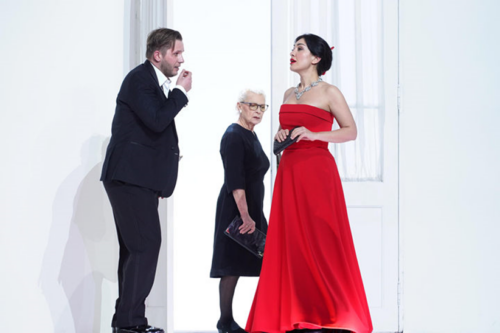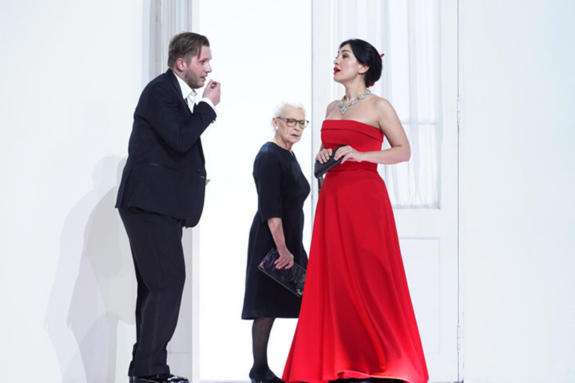 Spain Tchaikovsky, Eugene Onegin: Soloists, Chorus and Orchestra of Teatro Real / Gustavo Gimeno (conductor). Teatro Real, Madrid, 3.2.2025. (JMI)
Spain Tchaikovsky, Eugene Onegin: Soloists, Chorus and Orchestra of Teatro Real / Gustavo Gimeno (conductor). Teatro Real, Madrid, 3.2.2025. (JMI)

Production:
Director – Christof Loy
Sets – Raimund Orfeo Voigt
Costumes – Herbert Murauer
Lighting – Olaf Winter
Choreography – Andreas Heise
Chorus director – José Luis Basso
Cast:
Eugene Onegin – Iurii Samoilov
Tatyana – Kristina Mkhitaryan
Lensky – Bogdan Volkov
Zaretsky / Prince Gremin – Maxim Kuzmin-Karavaev
Olga – Victoria Karkacheva
Larina – Katarina Dalayman
Filipyevna – Elena Zilio
Monsieur Triquet – Juan Sancho
Captain – Frederic Jost
Once again, Teatro Real has staged this Tchaikovsky opera, which is the most-often performed of all his operas and was last put on here in 2010. On this occasion, there is a single cast, and it all worked well, although it is not one of those operas that leaves a lasting memory.
The production, by German director Christof Loy, is a co-production of Teatro Real with Barcelona’s Liceu and the Oslo Opera. It premiered in the Norwegian capital four years ago, and I had the chance to see it at the Liceu in October 2023 – I was not enthusiastic then, and I am not now either.
There are two different parts. The first centers around Tatyana, while the second is about Onegin and his memories. The action here is brought into modern times which is problematic, especially in the scene of the duel between Onegin and Lensky. Duels make more sense in a nineteenth-century setting than the twenty-first.
All the scenes in the first part are set in the simple dining room in Tatyana’s house. The second part takes place on a very small stage with a large white wall enclosing it. The duel between Lensky and Onegin takes place here, and also the party at Prince Gremin’s house where Lensky’s corpse lies but gets up to run away. This does not seem to happen except in Onegin’s mind.

The costumes are all in black and white, with the exception of Tatyana’s entrance in the last act in a brilliant red evening dress. For the final scene with Onegin, she wears the clothes from earlier in the opera. Overall, I did not find it to be a very interesting production.
Conductor Gustavo Gimeno, the current musical director of Teatro Real, is inaugurating his mandate with these performances. His conducting seemed fine to me, and more brilliant than moving. The Teatro Real Chorus and Orchestra, on whom there are many demands in this opera, were good.
Onegin was played by baritone Iurii Samoilov who was, in my opinion, the best vocally in the entire cast. He has thus confirmed the good memory I have of him in the same role at the Liceu and in his previous performance at the Teatro Real in the The Golden Cockerel. His voice has substance, and he is an admirable singer as well as a fine performer.
Soprano Kristina Mkhitaryan as Tatyana was also good although she lacked emotion in her big scenes, particularly in the Letter Scene but also somewhat in the final one with Onegin. She is a good soprano overall, but she has to deal with the memory I have of the first Onegin I attended where Mirella Freni was Tatyana.
The unfortunate poet Vladimir Lensky was tenor Bogdan Volkov who sang his aria with gusto and gave a good performance, although for my taste his voice sounds too light for the role.
Bass Maxim Kuzmin-Karavaev covered the roles of Zaretsky and Prince Gremin. His great aria in Act III did not thrill me, but he too had to struggle with my memory of that Bordeaux performance where Prince Gremin was sung by Nicolai Ghiaurov, to me the best Gremin ever. Olga was played by Russian mezzo-soprano Victoria Karkacheva, whom we had heard in the role at the Liceu, and she did nicely.
Two of those whom we could call old glories held the roles of Madame Larina and the nurse Filipyevna. I am referring to Katarina Dalayman, one of the great Wagnerian sopranos of recent years, who still has a notable voice although, obviously, not the one she had. The other veteran was mezzo-soprano Elena Zilio who made her debut in opera 62 years ago and still has a sonorous voice today.
Finally, Juan Sancho as Monsieur Triquet did well.
José M. Irurzun
